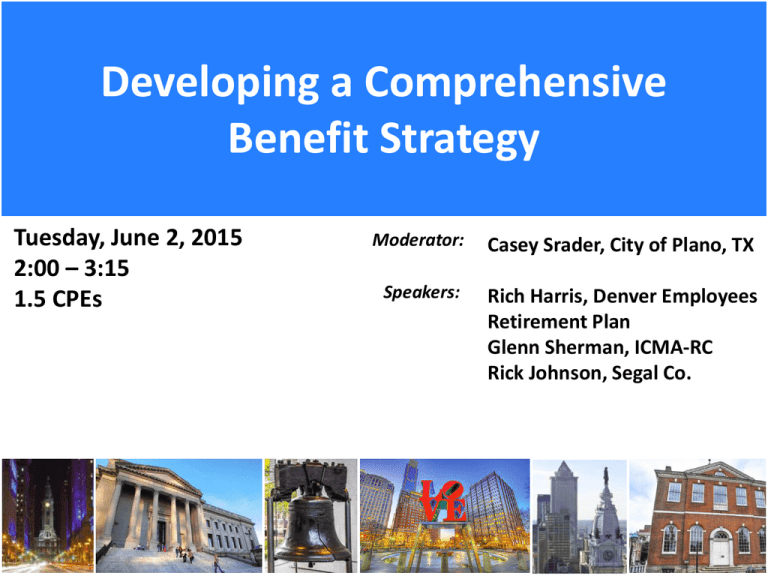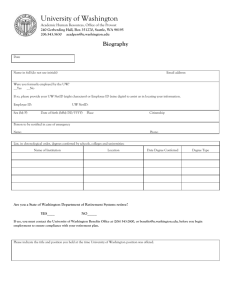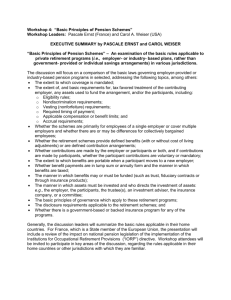
Developing a Comprehensive
Benefit Strategy
Tuesday, June 2, 2015
2:00 – 3:15
1.5 CPEs
Moderator:
Casey Srader, City of Plano, TX
Speakers:
Rich Harris, Denver Employees
Retirement Plan
Glenn Sherman, ICMA-RC
Rick Johnson, Segal Co.
COMPREHENSIVE
BENEFITS STRATEGY
How it all fits together…
Rich Harris
Denver Employees Retirement Plan
Retirement
Income
Social
Security
Personal
Savings and
Investments
We all know about these
three legs of the stool.
Typical
State/Local
Gov’t Pension
But are employees
taking full advantage of
what’s being offered?
2
The following table shows one of the most important
calculations in almost every American’s life:
AIME
Applicable
Benefit
Percentage
Applicable
Benefit
Lowest Tier
$826
90%
$743
Middle Tier
$4,154
32%
$1,329
Highest Tier
$4,086
15%
$613
Total Monthly Maximum
$9,066
30%
$2,686
Annual Maximum
$108,792
30%
$32,227
Do you see how it is “biased” toward low earnings?
But how many people really understand the significance of
that?
Social Security – How it Works
3
Annual Social Security
Benefits as a Percentage of Increasing
Levels of Average Indexed Earnings
100% 90%
80%
60%
40%
20%
0%
42%
30%
How Social Security Works
4
Annual Social Security Benefits for
Varying Levels of Earnings
$35,000
$30,000
$25,000
$20,000
$15,000
$8,640
$10,000
$5,000
$0
$32,108
$24,565
End of Career Annual Earnings
How Social Security Works
5
Analysis of “Strength of Stool Leg”
Social
Security
Employee Contributions?
Yes
Employer Contributions?
Yes
Required Participation
Party Responsible for
Paying Benefits
Yes
US Gov’t
Benefit Maximization
Strategy
Paying FICA
taxes for 35
years
Benefits Payments Term
Lifetime
Survivor Benefits
Available?
Yes
Inflation Protected?
Yes
Strength of “Stool Leg”
Strongest
6
Example of Typical Public Sector DB
◦ 1.5% multiplied by number of years of credited service
times the average monthly salary (based on the highest
36 consecutive months of salary)
◦ Example: The member is age 65, has 20 years of
credited service, has an end of career annual salary of
approximately $60,000 and an average monthly salary of
$5,000.
◦ 1.5% X 20 Years = 30% X $5,000 = $1,500/month, or
$18,000 per year
This calculation represents a Normal Retirement benefit
How is A Typical DB calculated?
7
$35,000
$30,000
Typical State/Local Gov’t Retirement
Benefits Depending on Years of Service
$31,500
Assuming High Average Annual
Salary = $60,000 at age 65
$27,000
$25,000
$22,500
$18,000
$20,000
$13,500
$15,000
$10,000
$5,000
$9,000
$4,500
$0
5
10
15
20
25
Years of Service
30
35
Typical DB Annual Benefit
How Typical DB benefit is Calculated
8
Combined Social Security and Typical DB Benefit
at Varying Levels of Public Sector Service
$60,000
$50,000
$40,000
$30,000
$20,000
$10,000
$0
Assuming High Average Annual
Salary = $60,000 at age 65
$4.5K
$9K
$20K
$20K
5
10
$13.5K
$20K
$31.5K
$18K
$20K
$27.5K
$20K
15
20
25
Years of Service
Social Security Benefit at Age 66
$27K
$20K
$20K
30
35
Typical DB Benefit
Social Security benefits based on 35 years of
employment and end-of-career pay of $60,000
Combining Both Life Annuities
9
Combined Income Replacement at Varying
Levels of State/Local Gov’t Service
100%
80%
Assuming High
Average Annual Salary
= $60,000 at age 65
60%
40%
8%
15%
20%
33%
33%
5
10
23%
33%
30%
33%
38%
33%
45%
53%
33%
33%
30
35
0%
15
20
25
Years of Service
Social Security Benefit at Age 66
Typical DB Benefit
Social Security benefits based on 35 years of
employment and end-of-career pay of $60,000
Combining Both Life Annuities
10
Comparison of “Strength of Stool Legs”
Social
Security
Typical
Public
Sector DB
Employee Contributions?
Yes
Yes
Employer Contributions?
Yes
Yes
Required Participation
Party Responsible for
Paying Benefits
Yes
Yes
US Gov’t
Public Sector
Employer
Benefit Maximization
Strategy
Paying FICA
taxes for 35
years
Long career
with Employer
Benefits Payments Term
Lifetime
Lifetime
Survivor Benefits
Available?
Yes
Yes
Inflation-protected?
Yes
Maybe
Strength of “Stool Leg”
Strongest
It
Depends
11
5
End of
Career Pay
$30,000
$40,000
$50,000
$60,000
$70,000
$80,000
$90,000
$100,000
Years of State/Local Gov't Service
10
15
20
25
30
35
49%
57%
64%
72%
79%
87%
94%
45%
52%
60%
67%
75%
82%
90%
42%
49%
57%
64%
72%
79%
87%
40%
47%
55%
62%
70%
77%
85%
38%
46%
53%
61%
68%
76%
83%
37%
45%
52%
60%
67%
75%
82%
36%
43%
51%
58%
66%
73%
81%
34%
42%
49%
57%
64%
72%
79%
Combined End-of-Career Pay
Replacement from Social Security and
Typical State/Local DB
12
Contributes
to DC
Doesn’t
Contribute
to DC
Short-Term
Employee
Long-Term
Employee
Will have two
legs of
stool…Social
Security and
Individual
Retirement
Savings
Will have all three
legs of stool…Social
Security, Pension
and Individual
Retirement Savings
Will only have
one leg of
stool…Social
Security
Will have two
legs of
stool…Social
Security and
DB pension
One of my favorite “four-boxes”
13
Low earners and long-service employees
will get the most replacement
High earners will need long service to get
high replacement because Social Security
will top out for them
So, two groups then, high earners and
those with short government service need
to aggressively participate in their defined
contribution plans
So, where do public employees
stand?
14
Retirement
Income
Social
Security
Personal
Savings and
Investments
Public employees are in
a great position to take
advantage of all three
legs of the stool…
Typical
State/Local
Gov’t Pension
But they have to know
where they stand…
15
THANK YOU!!!
Rich Harris
Denver Employees Retirement Plan
Rharris@derp.org
(720) 723-2742
16
Creating Valuable Benefit Plans for
Public Sector Employees
.
Presented by:
Glenn Sherman, Vice President, Retirement Plans, ICMA-RC
June 2, 2015
Today’s Focus
Creating valuable benefit plans for employees
Educating employees and encouraging participation
Helping employees help themselves
Investing for retirement
Developing a retirement income strategy
Continuing engagement with retirees
18
Creating Valuable Benefit Plans for Employees
Employees taking on more responsibility
Prevalence of Defined Benefit pension slowing being eroded
Particularly for future public sector employees
Future of Social Security benefits uncertain
Increasing reliance on employer-based savings plans (e.g., 457
Deferred Compensation, 401 Defined Contribution)
The only leg of the “three-legged stool” individuals can
control
Crucial component for public sector employees
How do we create employer-based savings plans that will truly
benefit employees?
19
Helping Employees Help Themselves
Make things easy for employees!
Simpler is better
Avoid information overload
Online and mobile access is the way of the future
Enrollment
Contribution changes
Withdrawals
Automatic enrollment
Sometimes we all need a little push
Growing prevalence in the private sector; yet to take off in public
sector
20
Using Automatic Enrollment to Increase Participation
Select a “realistic” default contribution amount
Automatically increase contributions each year
Sometimes we all need a little push
In addition to new hires, consider automatically enrolling
current employees
Employees have ultimate control
Stop participating at any time
Account balance refundable within first three months of
enrollment
Change contribution amount and investment allocation at any
time
21
Educating Employees and Encouraging Participation
Employer education and support is vital to plan success
Be an advocate for the plan, not a “bystander”
Create plan awareness
Ensure relevant participant education
Promote “success stories” of older employees and retirees
New employees often trust and respect the opinions of older and
more experienced co-workers
Change the mindset
“Supplemental” plans must be viewed as crucial components of
an employee’s retirement income strategy, and not an
afterthought
22
Create Relevant Participant Education
Life Stage
Online/Multimedia
Group Seminars
Publications
Individual Meetings
To enhance the effectiveness of your education program, provide information
through multiple channels and avoid a “one size fits all” approach.
Confidential and Proprietary
23
23
23
Investing for Retirement
Diversification is key
Keep things simple – Beneficial for many employees
Offer single fund/service solutions that provide appropriate
diversification
Target-Date Funds
Target-Risk Funds
Managed Accounts
Offer choices for do-it-yourself investors
24
Investing for Retirement
Target-Risk
Funds
Target-Date
Funds
Managed
Accounts
Asset
diversification
Takes age into
account
⧠
Takes risk
tolerance into
account
⧠
Asset allocation
shifts over time
⧠
Considers other
assets and income
⧠
⧠
Additional fees
⧠
⧠
25
Developing a Retirement Income Strategy
Lifetime income is the key
Keep things simple – Beneficial for many employees
Offer single fund/service solutions that provide appropriate
diversification and generate retirement income
Retirement Income Funds
Managed Accounts (In-Retirement)
Guaranteed Monthly Withdrawal Benefit (GMWB) Funds
Convert defined contribution plan balances into
defined benefit “type” retirement income
Do-it-yourself investors can create their own discretionary
retirement income stream
26
Developing a Retirement Income Strategy
Retirement
Income
Funds
Managed
Accounts
(In-Retirement)
GMWB
Funds
Asset
diversification
Designed to
generate
retirement
income over life
expectancy
Payments
guaranteed over
lifetime
⧠
⧠
Considers other
assets and
retirement
income
⧠
⧠
Additional fees
⧠
27
Continuing Engagement with Retirees
Retiree education by plan provider increasingly important
Ensure retirees have access to information needed to
successfully manage finances in retirement
Relationship/outreach doesn’t end at retirement
Pursue forward looking efforts to strengthen income
component of employer-sponsored plans and mitigate
longevity risk
Solutions to convert defined contribution balances into defined
benefit “type” income
Combine traditional defined contribution payouts with longevity
insurance to protect against outliving assets
28
Developing a Comprehensive Benefit Strategy—
Health Benefits
Presented to GFOA 2015 Annual Conference by:
J. Richard Johnson
Senior Vice President,
National Public Sector Health Practice Leader
rjohnson@segalco.com
June 2, 2015
Copyright © 2015 by The Segal Group, Inc. All rights reserved.
Public Employers/Employees
Have Had It Easy
Few, if any, Federal regulations governing public sector health benefit plans
Benefits designs and employer subsidies have fattened over time in place
of direct pay increases
Hire to grave benefit promises
Retirees are rated as part of overall group, so their base premium rates are
understated to actual cost
Employees and retirees are sheltered from having to make detailed choices
among cost, coverage, networks, accessibility
Management of benefits access and service steerage usually stops short of
patient coercion
No taxability issues for employers or plan members
30
The Playing Field Has Changed!
Why it’s different now and for the future
1
Health Care Reform places new and increasingly more stringent
requirements onto public sector health plans
2
The Federal Government is now a player in every state and local
jurisdiction health plan.
3
Medicaid now impacts more employees and dependents
4
Public employers have had to make significant changes
to their health plan eligibility rules and/or workforce composition
5
An individual now has the ability to buy individual insurance without
pre-existing conditions outside of an employer health plan
6
Public plans have a new competitor (state marketplaces) that may
eventually be more cost effective for some groups
31
Threshold Changes
The Floor – Federal law now mandates public sector employers and
plans to provide a minimum level of benefits
The Ceiling – By 2018, the 40% Excise Tax imposes an effective
maximum on pre-tax health benefits
Increasing clamp on the richness of employer provided health benefits
Combined with reduced health care spending account cap
The Delivery Vehicle – State health insurance marketplaces
provide a new delivery vehicle for both individual and employer
sponsored health insurance
Standardized benefit levels will increasingly become the norm for defining health
benefit choices
Smaller private employers will ultimately use the SHOP exchanges as the most
efficient way to offload health benefit administration as a required employment tax
The Safety Net – Medicaid is now a factor for lower paid employees
and their dependents, as well as for retirees
32
Big Issues Public Employers
Must Address
No longer just “How well can we manage
health plan costs?” but now “How long can
we keep doing what we’ve been doing?”
How will we maximize federal health benefit
subsidies to ease our budgetary issues
while trimming benefits to avoid excise tax
penalties?
How will we attract new employees who are
settled into health exchange coverage and
no longer consider health benefits an
employment motivator?
How can we maintain generational equity
and balance among stakeholders with the
large influx of retiring Baby Boomers?
33
Big Issues Public Employers
Must Address
How will we realign our retiree health benefit
promises to send the right message for the
future?
Social Security Normal Retirement Age
continues to increase
Public sector retirement and health benefit
plans encourage early retirement
Economic needs encourage longer
employment just to keep subsidized health
benefits
Early retirees can now qualify for subsidies on
the state health exchange even if eligible for
employer plans
34
And Don’t Forget the Environmental Factors
The population keeps aging
(Older = Sicker = Costlier)
The cost of health care keeps rising faster than
inflation
Life expectancy is still increasing
More seniors are having to go back to work to
make ends meet, even with retirement benefits
35
Why Do People Work for Government?
In the Past…
Now…
1 Public service
Health benefits
2 Stability of employment
Stability of employment 2
3 Retirement benefits
Work environment
3
4 Work environment
Retirement benefits
4
5 Compensation
Public service
5
6
Compensation
6
Health benefits
1
Health benefits have changed from an attractive perk
to a major reason for government employment
36
Retiree Health Benefits Are Under Attack
Eligibility cut
backs
Medicare
Advantage /
Medicare Part D
OPEB cost
and liability
reduction
Benefit
reductions to
avoid 40%
Excise Tax
Reduction in
employer
provided
subsidy
Plan availability
reductions
Public and
private
exchanges
ACA
requirements for
employer group
health plans
37
How Health and Retirement
Benefits Interact
Medical inflation is higher than general inflation
Medical plan increases based on a higher trend than any retirement COLAs
COLAs are vanishing or being limited
Increasing share of a retiree’s fixed pension benefit goes to pay for
health benefit coverage
Medicare helps starting at age 65, but not a free ride
Average couple retiring at age 65 now will need $220,000 or more to
pay for their health care costs during retirement.1
Even after Medicare coverage
Does not include nursing home costs
1
Fidelity Viewpoints, June 11, 2014
38
Develop a Comprehensive
Benefit Strategy
Health Benefits
Divide and conquer - separate plans for actives and retirees
Specifically designed for their needs
Medicare Advantage / Medicare supplement / Private exchange
Public exchange for early retirees – possibly allows them to get federal subsidy
Reduce OPEB liability
Lower premiums for actives
Clean up your act
Eliminate unnecessary benefits – perks or drains?
Think voluntary coverage
Promote Wellness – both Physical and Financial
Health fairs are fun, but…
Financial planning may be more beneficial to employees in the long run
39
Develop a Comprehensive
Benefit Strategy - 2
Target the communication to the audience
Size up your population
– Demographics
– Job environment – Desk or street? Factory or think tank?
Different people learn differently
To be effective, must have
– Different messages (even if the same plans)
– Different emphasis for different groups and ages
– Different channels
– Multiple channels
Present benefits as a package – always!
Retirement – Health – Work Environment – Pay
Develop common branding across all benefit types – and use it!
40
Develop a Comprehensive
Benefit Strategy – 3
Take the employee/retiree viewpoint in making decisions on benefit
changes and costs
What percent of take home income does the employee/retiree spend now on
health and retirement benefits?
Can the employee or retiree afford the premium increase?
Will the copay or deductible increase cause lower paid workers to avoid seeking
necessary care?
What’s the five-year horizon of expected employee/retiree cash outlay for the
change?
Will there be pay adjustments / COLAs to help offset the additional plan cost?
Show detailed examples of real people situations
Helps employees/retirees relate and understand their choices across plans
41
How to Begin
Get all the decision makers together
Talk overall financial stream in career and retirement
Promote a common understanding
Accountability across departments/agencies
Develop an overall strategy
Start simple and don’t overdo too early
Focus on the important things
First on affordability for the employee/retiree
Then on what the employer must provide
Then on what you can provide within budget
Know and monitor all three factors each year
Use them as a yardstick in assessing possible changes
Decisions won’t be easy, but it helps to have a common vocabulary
and measurement standards
42
Health Reform Resources
On the Segal Website:
Rick Johnson
Senior Vice President
rjohnson@segalco.com
212.833.6470
www.segalco.com
Health Care Reform Timeline
Health Care Reform Insights
Stat!
Bulletins
Public Sector Letters
Webinar recordings and slides
Health Reform Resources:
http://www.segalco.com/publications-and-resources/health-care-reform/
43
Please provide feedback on the session
o Quick Text Feedback
1. Step 1 - Text “GFOA” to 22333
2. Step 2 - Did the session meet your expectations
for being high quality and relevant to your job?
• Exceeded Expectations– Text “T6EXC”
• Met Expectations – Text “T6MET”
• Did Not Meet – “T6NOT”
o To provide more detailed evaluation on the
session or full conference go to
www.gfoa.org/evals





